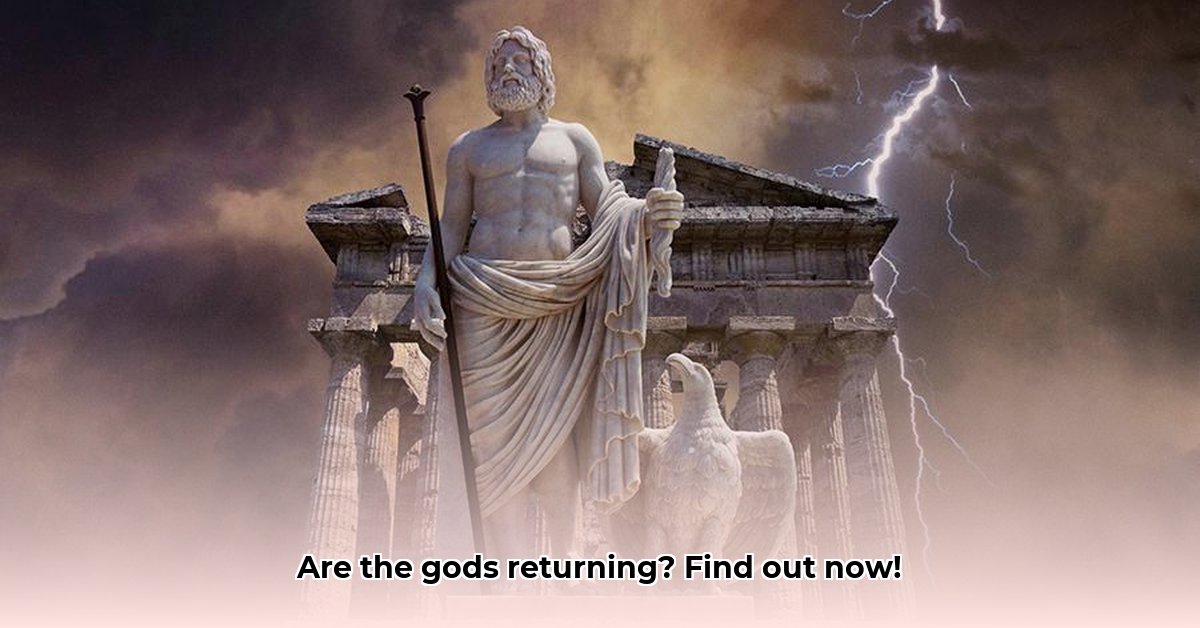Jonathan Cahn’s The Return of the Gods has ignited considerable discussion, proposing that ancient Mesopotamian deities are influencing today’s global transformations. For another perspective on prophetic interpretations, see this resource. This article undertakes a critical examination of Cahn’s core thesis, questioning the strength of the connections he draws between historical myths and modern societal shifts. We dissect his central arguments, contrasting them with alternate explanations for the complex changes occurring in our world. This is an investigation into the substantiating evidence supporting Cahn’s claims, as well as an exploration of the book’s societal impact, advocating for well-informed perspectives on this complex issue.
Decoding the Return of the Gods: A Critical Look at Cahn’s Claims
Jonathan Cahn’s The Return of the Gods suggests that modern chaos stems from the resurgence of ancient Mesopotamian spiritual forces, connecting these forces to present-day occurrences. But is his data actually solid, and what are the underlying assumptions driving his narrative? We delve deep to uncover the nuances of Cahn’s argument.
Cahn’s Story: Ancient Echoes in Modern Times?
Cahn posits that powerful Mesopotamian entities are actively manipulating events in the modern world. Through recurring themes, archetypes, and symbols, such as the “Dark Trinity” and the concept of “The Possessor,” he attempts to bridge ancient mythology with current affairs. While this narrative framework is undeniably captivating, the extent of its factual anchoring and verifiable accuracy needs to be rigorously checked. Is Cahn presenting a compelling interpretation of historical and contemporary events, or is he primarily constructing a modern myth based on selective evidence and subjective interpretations?
The book is undeniably engaging, as Cahn intricately weaves together historical contexts, religious symbolism, and an array of happenings from recent times. However, serious challenges arise when critically assessing Cahn’s justifications and the logical validity of his arguments. What verifiable facts are presented to support the claim that these “Gods” have any direct, causative impact on complex phenomena such as global economics, geopolitical conflicts, or socio-political discord? Are there more plausible and empirically supported explanations for these events that do not rely on the intervention of ancient deities?
Connecting the Dots: Ancient Myths and Modern Realities
Cahn leverages interpretations of ancient texts to bolster his argument, drawing parallels between ancient narratives and modern events. These interpretations, however, are often highly subjective and open to various understandings and perspectives. Hard, irrefutable scientific evidence validating these large-scale claims is conspicuously missing from Cahn’s analysis. The absence of objective, verifiable support significantly weakens the overall persuasive power of his argument. How can Cahn present his claims with such certainty and conviction when the interpretations upon which they are based are inherently subjective and potentially influenced by his own pre-existing beliefs and biases?
Beyond the Gods: Other Factors Shaping Our World
The world’s inherent complexity far exceeds the scope of any singular explanation or interpretive framework. Attributing all societal shifts and global events to the singular cause of the “return of the gods” oversimplifies the multifaceted nature of reality. Technological advancements, transformations in global economics, evolving political ideologies, demographic shifts, and complex cultural movements all play significant and interconnected roles in shaping the world we inhabit. This broader context, which Cahn’s narrative largely overlooks or downplays, involves a multitude of contributing factors that cannot be easily reduced to the actions of ancient deities. What roles do globalization, wealth distribution, access to education, and evolving social norms play in driving societal shifts, and how do these factors interact with religious beliefs and spiritual interpretations of the world?
Interpreting the Past: Different Perspectives, Different Meanings
Cahn interprets ancient texts and historical events through a specific theological lens, relying heavily on allegorical interpretations that hold particular meaning and resonance within his own religious context. However, this approach inevitably creates challenges for those who do not share the same theological framework or interpretative traditions. Symbol and story interpretation varies significantly based on individual cultural contexts, personal experiences, and pre-existing worldviews. This introduces the potential for bias and subjectivity, potentially limiting the book’s broader appeal and reducing its credibility among those who approach the subject matter from different perspectives. How much does personal belief and pre-existing theological commitments influence the interpretation of historical texts and the attribution of meaning to contemporary events?
The Ripple Effect: Cahn’s Book and Its Impact
The Return of the Gods is generating considerable interest, but what are its broader implications for society, and how might it influence public discourse on religion, politics, and culture?
| Stakeholder Group | Potential Short-Term Impact | Potential Long-Term Impact |
|---|---|---|
| Cahn’s Followers | Reinforces existing beliefs; strengthens community ties; increased engagement with religious practices. | Continued adherence to Cahn’s worldview; potential for increased social and political activism; possible social isolation from those holding differing views. |
| Academics and Researchers | Increased scrutiny of Cahn’s claims and related discussions; scholarly debate on the relationship between religion, mythology, and contemporary society. | Further research on the role of mythology in shaping cultural narratives; deeper understanding of the influence of religious beliefs on political attitudes and social behaviors. |
| The General Public | Heightened interest in mythological and religious topics; increased awareness of the role of religion in shaping cultural values. | Potential spread of misinformation if claims are not critically examined; increased polarization of views on religious and political issues; potential for the misuse of religious narratives to justify harmful actions. |
| Media & Publishers | Increased coverage of Cahn’s book and viewpoints; greater attention to religious and mythological themes in popular culture. | Changes in interpretations of similar religious or mythological content; greater sensitivity to the potential impact of religious narratives on public opinion and social discourse. |
A Balanced View: Storytelling vs. Evidence
The Return of the Gods is undoubtedly an engaging and thought-provoking read, driven by Cahn’s compelling storytelling abilities. He masterfully combines historical events, religious symbols, and current affairs to create a narrative that resonates with many readers. While compelling, a critical evaluation of the book’s claims is essential for responsible engagement with its ideas. Compelling narratives do not automatically equate to absolute truth or factual accuracy. A thorough and unbiased examination of the evidence presented, or the lack thereof, is critical before accepting the book’s central arguments. The world necessitates nuanced and realistic explanations for its complexities, rather than relying on simplistic solutions that may oversimplify complex issues. Does a compelling narrative excuse a lack of verifiable evidence, or does it place an even greater responsibility on readers to critically evaluate the claims being made?
How to Critically Analyze Jonathan Cahn’s The Return of the Gods
Key Takeaways:
- Cahn theorizes that modern societal shifts mirror the resurgence of ancient pagan deities.
- His data stems mainly from biblical prophecy, symbolic interpretation, and selective historical accounts.
- A reliance on interpretations and a lack of rigorous empirical data undermines his claims.
- Analyzing Cahn demands scrutiny of his methodology, evidence presented, and interpretative viewpoints.
- Consider comprehensive alternative explanations for cultural changes that incorporate diverse perspectives and factors.
Understanding Cahn’s Central Argument
Jonathan Cahn’s The Return of the Gods introduces a provocative thesis: that observable societal changes are not merely secular events but reflect the reemergence of ancient pagan spiritual dynamics. He identifies specific deities, such as Baal, Ashtoreth, and Molech, as central to this resurgence, arguing that they exert influence on contemporary culture. How to critically analyze Jonathan Cahn’s The Return of the Gods necessitates a deliberate and systematic process that considers multiple angles and perspectives.
Deconstructing the Narrative: A Step-by-Step Approach
For an informed and balanced assessment of Cahn’s work, consider the following steps:
-
Summarize the Core Thesis: Accurately and concisely outline Cahn’s central argument. What specific claims are central to his thesis, and what evidence does he offer to support them?
-
Analyze the Evidence: Evaluate the nature and quality of the evidence presented by Cahn. Is it primarily historical, sociological, or empirical, or is it largely based on subjective interpretations of scripture, symbolic associations, and anecdotal observations?
-
Identify Interpretative Biases: Critically scrutinize Cahn’s interpretations of historical events, cultural phenomena, and religious texts. Are his interpretations objective and impartial, or are they influenced by pre-existing theological beliefs, personal biases, and a particular worldview? Consider alternative viewpoints and interpretations of the same events.
-
Evaluate Logical Consistency: Examine the logical coherence and internal consistency of Cahn’s narrative. Are there any logical fallacies, inconsistencies in his reasoning, or unsupported leaps in his argumentation?
-
Seek Corroborating Evidence: Investigate whether Cahn’s claims are supported by independent sources, scholarly research, or established historical accounts. Check reliable sources to determine whether other experts corroborate or contradict his claims.
-
Consider Alternative Explanations: Explore secular, sociological, psychological, and historical explanations for the phenomena that Cahn attributes to spiritual forces. Are there plausible alternative interpretations that do not rely on supernatural intervention or the influence of ancient deities?
-
Assess the Potential Impact of the Book: Reflect on the potential effects of Cahn’s book on readers’ beliefs, attitudes, and actions. What are the potential positive and negative impacts of his message on society, and how might it influence public discourse on religion, politics, and culture?
















